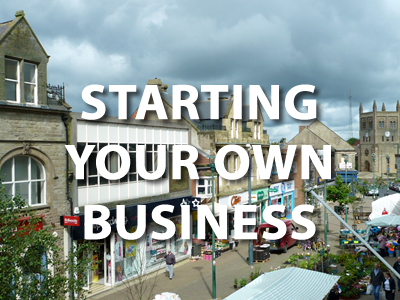When I got started in business eight years ago there was very little assistance available to assist me with the of 100s of questions I had about; banking, invoicing, accounting, registering as self-employed, renting an office, insurance, employment, sales & marketing, data management, etc – the list goes on…
The truth is, I had to research and educate myself about all of these business topics myself.
Now I’m hoping to share what I’ve learnt over the years with others by publishing short business guides here in the Consett Magazine to assist and encourage other people to get their business up and running.
If you’re planning to join the community of Consett entrepreneurs and launch your own business in 2019, this guide will hopefully help you to get your new business off the ground.
Six Tips for Starting Your Business
1. Write a business plan
Consett entrepreneurs need a business plan. This will help you determine whether your business ideas are likely to succeed and be sustainable. You’ll need to research the market and also prepare budget forecasts. You can download a business plan and cash flow forecast template from the UK government website: https://www.gov.uk/write-business-plan
2. Decide on your business legal structure
Do you want to become a sole trader, partnership, limited company or just a freelancer? These different legal structures have pros and cons, read about each type and decide which one is best for your needs.
3. Choose a business name and address
If you’re a sole trader, you can just use your own name if you want. You’ll need an address for when it comes to registering your UK business for tax purposes and joining the company register in the UK. Only limited companies need to register their name, although others can register as a trademark to stop anyone else from trading under the name.
4. Setting up as a Limited Company
If you decide to set up a limited company you will need to appoint directors and a company secretary, work out your shares and shareholders, write your memorandum and articles of association, open a separate bank account and register for corporation tax.
5. Register with HM Revenue and Customs
You will need to register your UK business with HMRC for tax purposes. Limited Companies need to register with Companies House at the cost of £12 (online) or £40 (post).
6. Check if there are any additional rules for your type of start-up business
Depending on the nature of your new business, there may be additional requirements, such as:
• Licenses or permits (e.g. to sell food or alcohol, play music or trade in the street)
• Insurance
• Rules to follow if you buy or sell goods abroad or store/use personal information
Being self-employed in the UK is fairly common with around 15% of the workforce registered as self-employed.
I hope this short guide has been of value to you, especially if you are thinking about starting your own business. In the coming months, I’ll be publishing more business guides to help your business succeed on my company’s blog fireflynewmedia.com/blog/ and on the Consett Magazine website.
By Barrington Kirkham
Founder of Firefly New Media UK
Call: 01207 438 292
Email: sales@fireflynewmedia.com
Visit: fireflynewmedia.com






